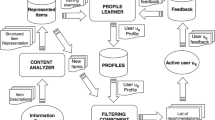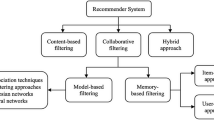Abstract
Researchers would like to publish their research articles in reputed journals along with quick review time. However, with the growing number of academic publications, it is becoming more difficult for scholars to find venues that are relevant to their domain. This study aims on the development of a technique that focuses on the priorities of the researchers that are linked to the recommendation of suitable suggestion of publication journal. The developed Recommendation System (RS) takes title, abstract, and keyword of the manuscript to be submitted. The proposed algorithm, named PUB-VEN which is hybridization of Content-Based Filtering (CBF), and Collaborative Filtering (CF), which is integrated with the Multi-Criteria Decision Making (MCDM) process to provide suitable journal recommendations by considering the researcher's point of view about different attributes gathered such as impact factor, eigen factor, average review time, etc. which affect the research process effectively. Our results demonstrate that the PUB-VEN provides better recommendations in comparison with state-of-the-art algorithms such as Term Frequency and Inverse Document Frequency (TF-IDF) and Latent Semantic Analysis (LSA). The study concluded that PUB-VEN is providing better precision, recall, F1 Score, Discounted Cumulative Gain (DCG), and Normalized DCG (NCDG). For precision, the gain ranges from 1% to 16%, the improvement in recall is between 33% and 3%, the betterment of result in F1 is by the ratio which ranges from 27% and 2%, the improvement in the result of DCG lies between 15% and 5% and the result of NDCG gain ranges from 6% to 1%. It is useful for the researchers in finding suitable venue for publication.






Similar content being viewed by others
Notes
https://www.aminer.org/citation, Accessed in 2021.
References
Lewallen LP, Crane PB (2010) Choosing a publication venue. J Prof Nurs 26:250–254
McKercher B (2015) Why and where to publish. Tour Manage 51:306–308
Ajmal S, Muzammil MB (2019) PVRS: publication venue recommendation system a systematic literature review. 2019 5th International Conference on Computing Engineering and Design (ICCED). IEEE, pp. 1–6
Lu J, Wu D, Mao M, Wang W, Zhang G (2015) Recommender system application developments: a survey. Decis Support Syst 74:12–32
Stitini O, Kaloun S, Bencharef O (2022) An Improved Recommender System Solution to Mitigate the Over-Specialization Problem Using Genetic Algorithms. Electronics 11:242
Basgall MJ, Naiouf M, Fernandez A (2021) FDR2-BD: a fast data reduction recommendation tool for tabular big data classification problems. Electronics 10:1757
Ko H, Lee S, Park Y, Choi A (2022) A survey of recommendation systems: recommendation models, techniques, and application fields. Electronics 11:141
Muzammil MB, Ajmal S, Javed S, Tariq A, Iqbal U (2021) M-RS: a systematic literature review on multi-objective optimization along with recommendation system. 2021 International Conference on Engineering and Emerging Technologies (ICEET). IEEE, pp. 1–8
Lops P, De Gemmis M, Semeraro G (2011) Content-based recommender systems: State of the art and trends. Springer, In Recommender systems handbook, pp 73–105
Haruna K, Ismail MA, Damiasih D, Sutopo J, Herawan T (2017) A collaborative approach for research paper recommender system. PLoS One 12:e0184516
Schafer JB, Frankowski D, Herlocker J, Sen S (2007) Collaborative filtering recommender systems. Springer, In The adaptive web, pp 291–324
Chen L, Yuan Y, Yang J, Zahir A (2021) Improving the prediction quality in memory-based collaborative filtering using categorical features. Electronics 10:214
Burke R (2002) Hybrid recommender systems: survey and experiments. User modeling and user-adapted interaction 12:331–370
Ano E, Morisio M (2017) Hybrid recommender systems: a systematic literature review. Intell Data Anal 21:1487–1524
Wang S, Xu C, Ding AS, Tang Z (2021) A novel emotion-aware hybrid music recommendation method using deep neural network. Electronics 10:1769
Mohamed MH, Khafagy MH, Ibrahim MH (2019) Recommender systems challenges and solutions survey. 2019 International Conference on Innovative Trends in Computer Engineering (ITCE). IEEE, pp. 149–155
Ziarani RJ, Ravanmehr R (2021) Serendipity in recommender systems: a systematic literature review. J Comput Sci Technol 36:375–396
Zhang H, Wang Y, Chen C, Liu R, Zhou S, Gao T (2022) Enhancing knowledge of propagation-perception-based attention recommender systems. Electronics 11:547
Duan C, Sun J, Li K, Li Q (2021) A dual-attention autoencoder network for efficient recommendation system. Electronics 10:1581
Kreutz CK, Schenkel R (2022) Scientific paper recommendation systems: a literature review of recent publications. Int J Digit Libr 23(4):335–369
Iana A, Paulheim H (2021) GraphConfRec: a graph neural network-based conference recommender system. 2021 ACM/IEEE Joint Conference on Digital Libraries (JCDL). IEEE, pp. 90–99
Dwivedi YK, Hughes L, Cheung CM, Conboy K, Duan Y, Dubey R, Janssen M, Jones P, Sigala M, Viglia G (2022) How to develop a quality research article and avoid a journal desk rejection. Int J Inf Manag 62:102426
Triantaphyllou E (2000) Multi-criteria decision making methods. In Multi-criteria decision making methods: A comparative study; Springer, pp. 5–21
Therdoost H, Mitra M (2023) Multi-criteria decision making (MCDM) methods and concepts. Encyclopedia 3(1):77–87
Kauffmann E, Peral J, Gil D, Ferrandez A, Sellers R, Mora H (2019) Managing marketing decision-making with sentiment analysis: an evaluation of the main product features using text data mining. Sustainability 11:4235
Zhuang Y, Kim J (2021) A BERT-based multi-criteria recommender system for hotel promotion management. Sustainability 13:8039
Chang DY (1996) Applications of the extent analysis method on fuzzy AHP. Eur J Oper Res 95:649–655
Mukherjee P, Pattnaik PK, Al-Absi AA, Kang DK (2021) Recommended system for cluster head selection in a remote sensor cloud environment using the fuzzy-based multi-criteria decision-making technique. Sustainability 13:10579
Wang D, Liang Y, Xu D, Feng X, Guan R (2018) A content-based recommender system for computer science publications. Knowl-Based Syst 157:1–9
Rollins J, McCusker M, Carlson J, Stroll J (2017) Manuscript matcher: a content and bibliometrics-based scholarly journal recommendation system. BIR@ ECIR, pp. 18–29
Jain S, Khangarot H, Singh S (2019) Journal recommendation system using content-based filtering. in recent developments in machine learning and data analytics; Springer, pp. 99–108
Safa R, Mirroshandel S, Javadi S, Azizi M (2017) Venue recommendation based on paper? Title and Co-authors Network. Journal of Information Systems and Telecommunication 1(6):209–17
Pham MC, Cao Y, Klamma R, Jarke M (2011) A clustering approach for collaborative filtering recommendation using social network analysis. J UCS 17:583–604
Pham M, Cao Y, Klamma R (2010) Clustering technique for collaborative filtering and the application to venue recommendation. In Proc. of I-KNOW. Citeseer
Boukhris I, Ayachi R (2014) A novel personalized academic venue hybrid recommender. 2014 IEEE 15th International Symposium on Computational Intelligence and Informatics (CINTI). IEEE, pp. 465–470
Alhoori H, Furuta R (2017) Recommendation of scholarly venues based on dynamic user interests. J Informet 11:553–563
Yang Z, Davison BD (2012) Venue recommendation: submitting your paper with style. 2012 11th International Conference on Machine Learning and Applications. IEEE, 1:681–686
Xia F, Asabere NY, Rodrigues JJ, Basso F, Deonauth N, Wang W (2013) Socially-aware venue recommendation for conference participants. 2013 IEEE 10th international conference on ubiquitous intelligence and computing and 2013 IEEE 10th international conference on autonomic and trusted computing. IEEE, pp 134–141. arXiv:1312.6808
Asabere NY, Xia F, Wang W, Rodrigues JJ, Basso F, Ma J (2014) Improving smart conference participation through socially aware recommendation. IEEE Trans Human-Mach Syst 44:689–700
Zhang AX, Bhardwaj A, Karger D (2016) Confer: A conference recommendation andmeetup tool. Proceedings of the 19th ACMConference on Computer Supported CooperativeWork and Social Computing Companion. ACM, pp. 118–121
Mhirsi N, Boukhris I (2017) Exploring location and ranking for academic venue recommendation. International Conference on Intelligent Systems Design and Applications. Springer, pp. 83–91
Pradhan T, Gupta A, Pal S (2020) HASVRec: a modularized hierarchical attention-based scholarly venue recommender system. Knowl-Based Syst 204:106181
Pradhan T, Pal S (2020) CNAVER: a content and network-based academic venue recommender system. Knowl-Based Syst 189:105092
Pradhan T, Pal S (2020) A hybrid personalized scholarly venue recommender system integrating social network analysis and contextual similarity. Futur Gener Comput Syst 110:1139–1166
Bozanta A, Kutlu B (2019) HybRecSys: Content-based contextual hybrid venue recommender system. J Inf Sci 45:212–226
Yang Q, Li Z, Liu A, Liu G, Zhao L, Zhang X, Zhang M, Zhou X (2019) A novel hybrid publication recommendation system using compound information. World Wide Web 22:2499–2517
Kang N, Doornenbal MA, Schijvenaars RJ (2015) Elsevier journal finder: recommending journals for your paper. Proceedings of the 9th ACM Conference on Recommender Systems. ACM, pp. 261–264
Küüktun O, Saule E, Kaya K, Atalyürek V (2013) TheAdvisor: a webservice for academic recommendation. Proceedings of the 13th ACM/IEEE-CS joint conference on Digital libraries. ACM, pp. 433–434
Chen Z, Xia F, Jiang H, Liu H, Zhang J (2015) AVER: random walk based academic venue recommendation. Proceedings of the 24th International Conference on WorldWide Web. ACM, pp. 579–584
Yu S, Liu J, Yang Z, Chen Z, Jiang H, Tolba A, Xia F (2018) PAVE: personalized academic venue recommendation exploiting co-publication networks. J Netw Comput Appl 104: 38-47
Luong HP, Huynh T, Gauch S, Hoang K (2012) Exploiting social networks for publication venue recommendations. International Conference on Knowledge Discovery and Information Retrieval 2:239–245
Luong H, Huynh T, Gauch S, Do L, Hoang K (2012) Publication venue recommendation using author network?s publication history. In: 4th Asian Conference on Intelligent Information and Database Systems. Springer Berlin Heidelberg, pp. 426–435
Schuemie MJ, Kors JA (2008) Jane: suggesting journals, finding experts. Bioinformatics 24:727–728
Alshareef AM, Alhamid MF, El Saddik A (2018) Recommending scientific collaboration based on topical, authors and venues similarities. 2018 IEEE International Conference on Information Reuse and Integration (IRI). IEEE, pp. 55–61
Yang Z, Davison BD (2012) Distinguishing venues by writing styles. Proceedings of the 12th ACM/IEEE-CS joint conference on Digital Libraries. ACM, pp 371–372
Wongchokprasitti C, Brusilovsky P, Parra-Santander D (2010) Conference Navigator 2.0: community-based recommendation for academic conferences, ACM
Silva T, Ma J, Yang C, Liang H (2015) A profile-boosted research analytics framework to recommend journals for manuscripts. J Am Soc Inf Sci 66:180–200
Hornick M, Tamayo P (2012) Extending recommender systems for disjoint user/item sets: the conference recommendation problem. IEEE Trans Knowl Data Eng 24:1478–1490
Medvet E, Bartoli A, Piccinin G (2014) Publication venue recommendation based on paper abstract. 2014 IEEE 26th International Conference on Tools with Artificial Intelligence. IEEE, pp. 1004–1010
Pradhan T, Kumar P, Pal S (2021) CLAVER: An integrated framework of convolutional layer, bidirectional, LSTM with attention mechanism based scholarly venue recommendation. Inf Sci 559:212–235
Zhu C (2018) Journal Impact Factor (JCR 2018) 2018
Huh JH (2018) Big data analysis for personalized health activities: Machine learning processing for automatic keyword extraction approach. Symmetry 10:93
Holzinger A (2017) Introduction to machine learning and knowledge extraction (MAKE). Mach Learn Knowl Extr 1:1–20
Singh V, Saini B (2014) An effective tokenization algorithm for information retrieval systems. Departement of Computer Engineering, National Institute of Technology Kurukshetra, Haryana, India
Lovins JB (1968) Development of a stemming algorithm. Mech Translat Comp Linguistics 11:22–31
Alghamdi R, Alfalqi K (2015) A survey of topic modeling in text mining. Int J Adv Comput Sci Appl 6:1
Agarwal D, Chen BC (2010) fLDA: matrix factorization through latent dirichlet allocation. Proceedings of the third ACM international conference on Web search and data mining. ACM, pp. 91–100
Koren Y, Bell R, Volinsky C (2009) Matrix factorization techniques for recommender systems. Computer pp. 30–37
Acknowledgements
Thank for reviewer to improve our paper
Author information
Authors and Affiliations
Corresponding author
Ethics declarations
Conflicts of interest
The authors declare no conflict of interest.
Additional information
Publisher's Note
Springer Nature remains neutral with regard to jurisdictional claims in published maps and institutional affiliations.
Rights and permissions
Springer Nature or its licensor (e.g. a society or other partner) holds exclusive rights to this article under a publishing agreement with the author(s) or other rightsholder(s); author self-archiving of the accepted manuscript version of this article is solely governed by the terms of such publishing agreement and applicable law.
About this article
Cite this article
Ajmal, S., Sarfraz, M.S., Memon, I. et al. PUB-VEN: a personalized recommendation system for suggesting publication venues. Multimed Tools Appl 83, 42103–42124 (2024). https://doi.org/10.1007/s11042-023-16798-5
Received:
Revised:
Accepted:
Published:
Issue Date:
DOI: https://doi.org/10.1007/s11042-023-16798-5




